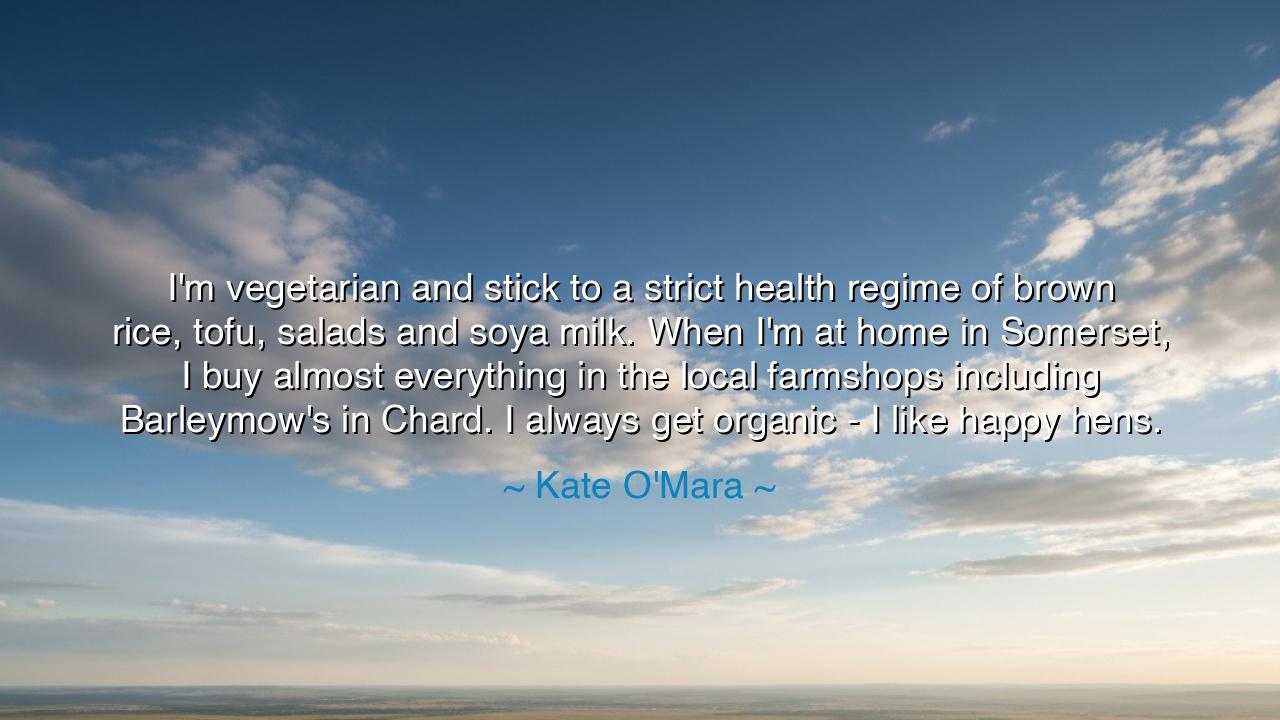
I'm vegetarian and stick to a strict health regime of brown rice
I'm vegetarian and stick to a strict health regime of brown rice, tofu, salads and soya milk. When I'm at home in Somerset, I buy almost everything in the local farmshops including Barleymow's in Chard. I always get organic - I like happy hens.






The graceful actress Kate O’Mara, known for her strength of character both on screen and in spirit, once said: “I’m vegetarian and stick to a strict health regime of brown rice, tofu, salads, and soya milk. When I’m at home in Somerset, I buy almost everything in the local farmshops including Barleymow’s in Chard. I always get organic—I like happy hens.” Though at first these words seem modest, a simple reflection of diet and daily life, beneath them flows a deeper current of ancient wisdom: the reverence for balance, discipline, and compassion toward all living things. In them, we hear the quiet philosophy of one who sought harmony between body and soul, between self and the earth that sustains us.
For to be vegetarian in spirit, as O’Mara was, is not merely to abstain from meat—it is to live with awareness, to honor life by choosing what nourishes without harm. It is a recognition that every act of consumption is also an act of communion, a bond between the eater and the earth. Her mention of brown rice, tofu, salads, and soya milk speaks not of deprivation, but of a sacred simplicity, the kind known to monks and sages of every tradition. They too understood that moderation and mindfulness in what one consumes leads to clarity of thought and serenity of heart. The modern world often calls this “diet,” but the ancients would have called it discipline, and discipline is the path to freedom.
When O’Mara speaks of her home in Somerset, buying from local farmshops, she reminds us of the wisdom of community—the importance of knowing where one’s sustenance comes from. The great philosopher Socrates once said that “the unexamined life is not worth living.” In her own way, O’Mara examined even her smallest choices, choosing to live consciously rather than blindly. By buying from her local farms, she was not only feeding her body but nourishing the circle of her community, strengthening the hands that tilled the same soil from which her own food arose. In such choices lies the ancient rhythm of reciprocity—what the land gives, we return in gratitude and care.
Her words about organic food and her fondness for “happy hens” may seem playful, yet they hold a profound moral truth. To desire that even the humblest creature live with joy is to possess a spirit of compassion that reaches beyond the self. In many cultures, this sentiment echoes the timeless teaching of ahimsa, or non-harm—the understanding that peace begins not in distant temples or parliaments, but in the gentle choices we make each day. O’Mara’s “happy hens” symbolize this truth: that when the living are treated with kindness, their very existence becomes a blessing that returns to us as nourishment without guilt.
History offers us many mirrors for this wisdom. The great Roman philosopher Seneca, though surrounded by the indulgence of empire, turned to a simple vegetarian life, believing that a pure diet purified the mind. He wrote that “the body should be treated more rigorously, that it may not be disobedient to the mind.” Likewise, the ancient Buddhists and Taoists taught that peace within the body creates peace within the world. O’Mara, living in an age of speed and excess, chose the slower, gentler path—one that the ancients would have called the Way of Harmony. In this, she became not only a performer upon the stage, but a quiet philosopher in the theater of life.
The lesson, then, is clear: to live well is to live consciously. The food we eat, the things we buy, the care we give to the creatures around us—all these are reflections of the spirit within. One need not be rich or famous to live with reverence; one need only be mindful. Eat simply, choose kindly, and seek to know the hands and hearts behind the gifts of the earth. When we act with awareness, even the smallest meal becomes a prayer of gratitude.
So, my children of the modern age, remember the wisdom in Kate O’Mara’s gentle declaration. Let your health be your temple, your table a place of peace, and your choices acts of kindness. Seek balance, as she did, between nourishment and compassion, between what you take and what you give. For in a world that rushes and consumes without thought, the mindful life is an act of quiet rebellion—and the greatest luxury is not wealth, but well-being.
Thus, as O’Mara teaches through her example, let us eat to live, not live to eat; let us care for the hens and the harvest alike. For when the body is nourished with purity and the heart guided by gentleness, life itself becomes a feast of harmony—and the spirit, like the earth, rests content and whole.






AAdministratorAdministrator
Welcome, honored guests. Please leave a comment, we will respond soon